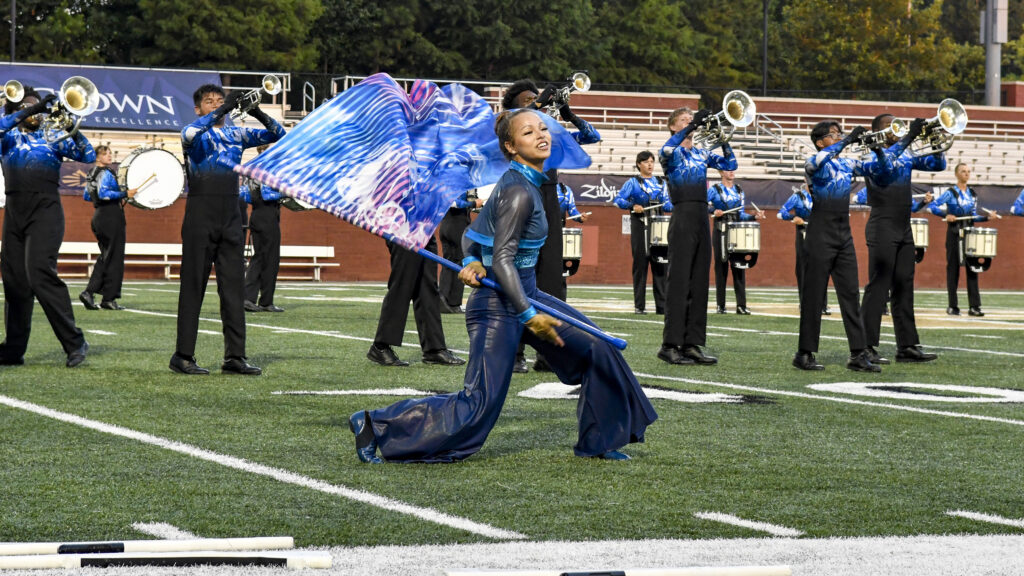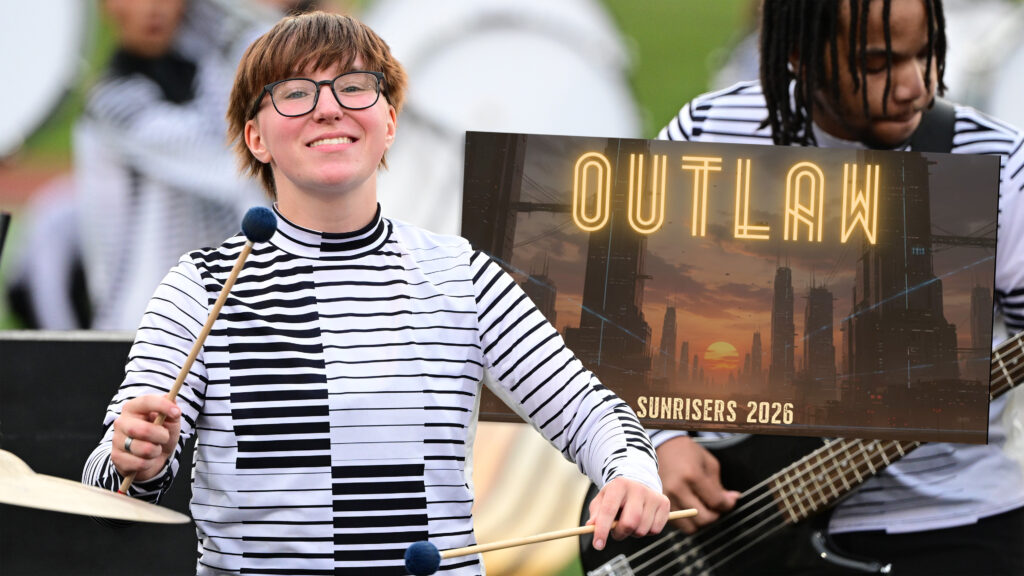The 1979 Drum Corps International World Championships marched into Legion Field in Birmingham, Alabama, for the first of two consecutive years.
The Blue Devils’ Finals night score of 93.550 became the highest yet earned in DCI competition, with the corps’ total general effect caption score just a tenth of a point away from a perfect score.
Phantom Regiment finished in second for the third year in a row, and both The Cavaliers and Troopers returned to the top-12 lineup; Cavaliers after falling out in 1978 and Troopers after being a non-finalist the prior three years.

Spirit of Atlanta finished in fourth place, particularly impressive in that 1979 marked just the third year the organization fielded a drum corps. Much of the group’s early success came after picking up famed brass arranger and horn instructor Jim Ott from the Blue Devils the previous year.
Spirit’s 1979 production opened with a sultry fanfare of “Georgia on my Mind,” written by Hoagy Carmichel in 1930. Ray Charles recorded the work in 1960 and sang it for the Georgia state legislature shortly before they declared it the official state song, less than four months prior to the DCI World Championships in Birmingham.
For the start of the fanfare, the color guard members in the front of the field performed an interpretive dance, before reaching down and pulling from their pants legs a variety of different solid colored scarves. Eventually the guard members in the back set down their flags to do the same.

The introductory fanfare led into the piece “Nutville,” written by Horace Silver who co-founded with Art Blakely in the early 1950s one of the most famous and longest lasting jazz ensembles in history, The Jazz Messengers. Spirit based its interpretation on the big band arrangement written for Buddy Rich’s “The Roar of ’74” album.
The rendition of “Nutville”—one of the hardest hitting pieces on the field that year—took Spirit into an intense form of swinging jazz not expected from the corps. They served notice that with Jim Ott at the helm, the brass section could deliver anything with serious aplomb.
The Moog synthesizer-generated “Geodesic Dance (Electronic Etude),” off the 1975 album, “Wendy Carlos – By Request,” returned from Spirit’s 1978 repertoire as a percussion feature. Visually the segment featured the color guard members wrapping their flag poles around the waists of those tossing rifles, while also sweeping the flags under the feet of the rifles and over their heads while tossed rifles rotated overhead.
Spirit turned to “Sweet Georgia Brown” for the standstill concert portion of the corps’ production. Originally written in 1925 by Maceo Pinkard and Ben Bernie, it was the hard-swinging Sammy Nestico arrangement for the Count Basie Orchestra’s “Prime Time” album that served as Spirit of Atlanta’s inspiration.
For a section near the end of the arrangement, the color guard performers took out bright yellow streamers from inside their uniforms, and when done waving the fabric, stuffed the streamers inside the legs of their trousers, which turned out to be quite versatile pieces of clothing.
For the second of three years in a row the corps closed its show with “Let It Be Me,” originally a French song written by Gilbert Bécaud in 1955, titled, “Je t’appartiens.” The tune received English lyrics in 1957 and was featured on the CBS television series, “Climax Mystery Theater,” one of the first programs broadcast in color. It achieved far greater success when recorded as a single by the immensely successful Everly Brothers in 1960, record holders of most Top 100 singles. It’s that version that Spirit brought to the field.
The euphonious backfield sonorities after the opening loud statement remain one of the most beautifully ethereal sounds yet produced in DCI competition. A final build that led into a powerful company front maneuver never failed to force audiences out of their collective seats.
1979 Overview

Michael Boo was a member of the Cavaliers from 1975-1977. He wrote about the drum corps activity for more than 35 years while serving as a staff writer for various Drum Corps International projects. During his lifetime Boo wrote for numerous other publications including an honors-winning book on the history of figure skating. He also was an accomplished composer. Boo passed away in 2020 and was inducted into the DCI Hall of Fame posthumously in 2021.





